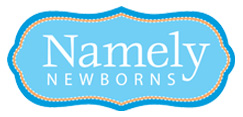Newborn Screening Tests - Will Genome Sequencing Replace Traditional Tests?
Posted by namelynewborns on Jan 1st 2015
After ninth months of pregnancy your baby is finally born. So many health decisions have been dealt with along the way. Screening tests have been done during early stages of pregnancy, decisions have been made regarding storing core blood and now that your baby has finally arrived. an additional test will be given after his birth. It is very confusing for the new mom and so many questions come to mind. Will this test hurt? What will I do if there is something wrong with my baby? Is it important to know right away about a condition?
Many factors go into determining what makes a newborn screening test worthwhile, and states come to their own conclusions about which tests make the most sense. In today's traditional testing over 31 core disorders are tested for. At this time a simple blood tests require just one quick prick of a needle on your infant's heel to collect a blood sample. For the hearing test, a small, soft earphone is temporarily placed in the child's ear. The screen for congenital heart defects, known as pulse oximetry,is also painless. Sensors are put on your baby's skin for several minutes to determine the amount of oxygen in the baby's blood and pulse rate. These procedures cause little discomfort. In fact, many babies sleep through them. Usually there is nothing wrong or if there is sometimes, simple remedies like diet can help. If there is something more serious , the parents have a lot of decisions to make.
The future holds many more scientific breakthroughs that will make these tests look primitive. Scientists are now studying a far more complicated and thorough test for newborns; this genome sequencing will become part of a government funded research program that could be the ultimate test providing a genetic blueprint of your baby at birth that will be carried through life.
In a recent Wall Street Journal article on December 30,2014 Robert C. Green a geneticist and researcher at Brigham and Women's Hospital in Boston says" In the next five to ten years as costs come down and interpretation is more established, it will increasingly be to everyone's advantage to have sequencing information integrated into their care".
What will this mean to us?
Doctor's will be able to identify diseases early enough to save a child's life or change the course of a disorder. Right now some hospitals already perform sequencing on a small number of newborns who signs of illness or developmental disease. This screening focuses on the 1% to 2% of the genomes believed to be responsible for most genetic disorders. The cost has dropped to $1000 but that is still a lot more than the $25 heel-prick blood test.
The availability of this tests brings up a lot of moral issues. Some families are not ready to have their children tested and deal with this kind of information. Right now the procedure is voluntary. But if it ever became mandatory, we would have be educated to understand the implications
Four million babies are born in our country each year. Approximately 14 % of these babies are admitted to a neonatal intensive care after birth. Imagine what this testing would mean to those newborns. Genome sequencing would help detect unusual genetic symptoms or diseases where babies don't exhibit typical symptom. It is logically that this would be helpful for acutely ill infants; but the jury is still out on whether well children would benefit.
